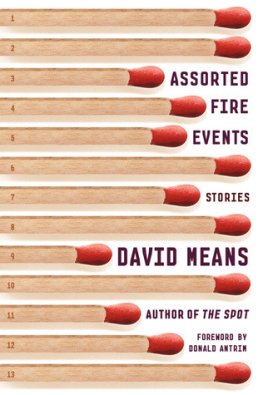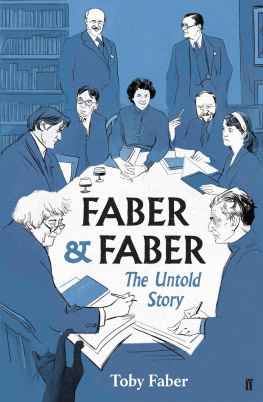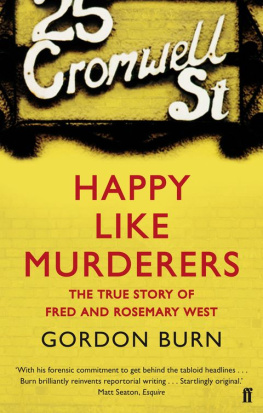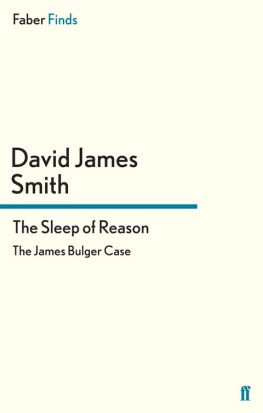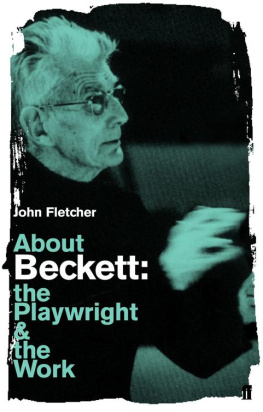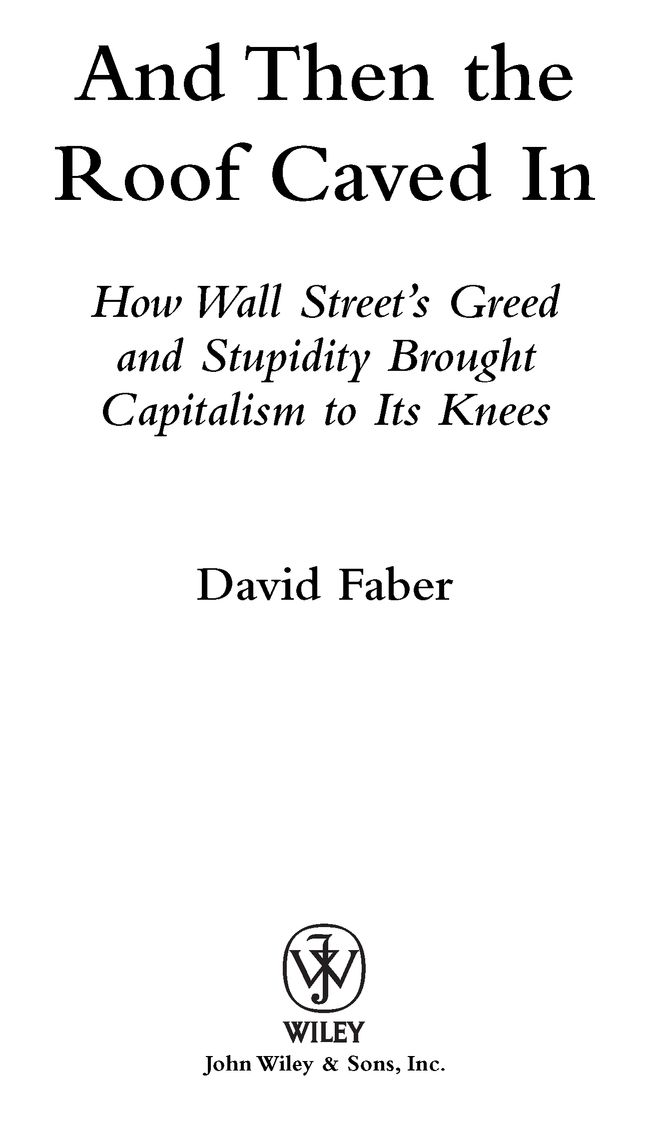Table of Contents
To Jonathan and Emily
Acknowledgments
This book is the product of my reporting about the financial crisis that has gripped the world over the past three years. It owes much of its content to the interviews I conducted on camera and off, for the CNBC documentary House of Cards, which first aired on that network in February 2009.The producer of House of Cards, James Jacoby, spent a year assembling and shaping its contents into a great piece of journalism. Without his work, this book would not have been written. Intelligent, creative, and warmhearted, James is a good friend to whom I am deeply grateful.
Documentaries are collaborative efforts, and as such, House of Cards owes its existence to a small group of wonderfully talented people to whom I am indebted. Jill Landes was its co-producer, a TV veteran to whom we would turn time and again to help us navigate a difficult and complex story. I am grateful for her work.
My deepest thanks go to my longtime video editor, the wonderfully talented Patrick Ahearn. Josh Howard is a great friend who, as head of our unit, thankfully gave us the go-ahead to produce House of Cards and helped guide us as we made it a reality. He also helped me come up with the title for this book. I was amazingly lucky to have Mitch Weitzner take over from where Josh left off. Mitchs insights helped make House of Cards, and thus this book, far better. My thanks go also to CNBCs management: Mark Hoffman, its president, and Jonathan Wald, who ran business news while House of Cards was in production.
Finally, I must acknowledge the wonderful work of my daytime producer, Mary Catherine Wellons, who kept me focused on my daily reporting on the crisis for CNBC, while I was also working on our documentary and this book. Shes a first-class person with a great mind and a great future.
The story in this book gains its power from the personal experiences related to me by those who were on the frontlines of the mortgage industry and Wall Street. Many of those people would not speak to me on the record, let alone on camera, and so I am especially grateful to the people who chose to do interviews. My thanks go to Michael Francis, Lou Pacific, Bill Dallas, Sylvain Raynes, Ann Rutledge, and Ira Wagner for taking on the tough questions about what they did and why they did it. My thanks as well to the many homeowners who spoke with us, including Arturo Trevilla and Ernesto and Trina Contreras.
Alan Greenspan gave generously of his time during a 90-minute interview that I will long remember. FDIC Chair Sheila Bair was forthcoming and full of insight. I am grateful to them both.
Kyle Bass has tutored me for the past three years in the scary science of subprime mortgages and CDOs. His deep understanding of those subjects helped inform this book. My thanks also go to Jimmy Frischling for aiding in my understanding of all manner of CDOs and securitized mortgage products.
Scott Waxman is unrelenting, a good quality for a book agent. He is also a great supporter. This book would not have happened without him and Im very happy to have him in my corner. The team at John Wiley & Sons has been nothing short of excellent. Im proud to be published by a company whose first love is books about business.
My friend, Wendy Flanagan, a much better writer than I, took the time to read my manuscript and assure me it all made sense. My deepest thanks to her. My thanks as well to all my friends for their constant support.
My love to my mom and dad and my entire extended family for their concern, support, and attention. I needed all of it.
The central person in my life is my wife, Jenny. She is my everything, including my first-line editor. During the many weekends when I wrote, she spirited our children out of the house for the day. Thats not always easy, even with the two greatest children in history. I like to believe they think it commonplace for a dad to be staying up nights and working weekends to write a book. Im sure that one day, if they choose to, theyll do a far better job than I. Im only glad that I have my weekends back to be with them. Nothing could be better than that.
D. F.
Prologue
On the Verge
Its September 14, 2008, the second week of the NFL season. After being out for the day, Ive returned home with my family and am hoping to settle into the couch to enjoy the days late game. But I know thats probably not going to happen. Try as I might to convince myself otherwise, this Sunday is far from typical. Ever since I left the office on Friday, I had been nervously awaiting this moment, when I could begin to make phone calls to try to find out whether the financial world that I have covered for the last 22 years is a thing of the past.
When I left my office at CNBCs headquarters on Friday, it was clear the storied investment bank Lehman Brothers was in deep trouble. I had been reporting on its worsening plight for months. Lehman had been battling a crisis of confidence that began in the earliest days of the credit meltdown. A financial company such as Lehman, which is exchanging vast sums of money every minute with other financial companies, must maintain the trust of those with whom it does business. The minute that trust disappears, as it did earlier in the year with Lehmans competitor Bear Stearns, the firm is unable to meet its obligations. In other words, its lights out. The concern among investors and, most importantly, the firms with whom it did business, was that Lehman was not being honest about the value of the assets on its balance sheet. The firm had played big in the mortgage industry and many did not believe Lehmans endless claims that it was marking its real estate-related assets at their appropriate value.
There had been plenty of days over the last year when Lehman was free of the rumors and doubt that would color its future. But, like a cancer that retreats into submission, yet still lurks within, Lehman had never been able to fully shake the concerns about its balance sheet. For Lehman, the last few weeks had seen the cancer return with a vengeance, and, as I left work late on Friday, it seemed certain the 114-year-old investment bank would be sold. If a sale couldnt be arranged, it was far from clear that Lehman could keep operating. That would mean only one thing: bankruptcy.
I pulled the phone to my lap, but still kept the football game on, somehow hoping it would all blow over. As I began to review my list of contacts to determine whom to call, my mind went back to a meeting I had with Lehmans chairman and CEO Richard Fuld only three months earlier. I had not seen Fuld for years and we both agreed it might be a good time to get reacquainted. And so, late one June afternoon, I headed to Fulds office in midtown Manhattan to try to get a better understanding of what was truly going on at the firm he had led for the previous 14 years. A day earlier, the firm had reported a second-quarter loss of $2.8 billion and said it was raising $6 billion in new capital. Lehman was certainly not in good shape, but it seemed poised to survive.
Fuld did most of the talking. He seemed to be testing out a new approach to explaining why his firm was going to thrive in the years ahead. I sat respectfully as he droned on, talking about Lehmans global franchise and all the ways it could make money beyond the financing of real estate. Fuld is a tough guy. But as I sat back and listened to him pontificate on the merits of the firm he had shaped, he seemed out of touch, as though he were not fully entrenched in the new reality of the financial world: a reality in which every firm had become suspect.


